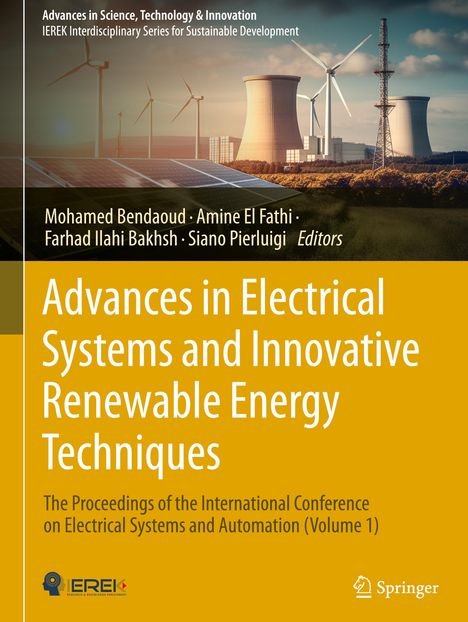Advances in Electrical Systems and Innovative Renewable Energy Techniques, Gebunden
Advances in Electrical Systems and Innovative Renewable Energy Techniques
Buch
- The Proceedings of the International Conference on Electrical Systems and Automation (Volume 1)
lieferbar innerhalb 2-3 Wochen
(soweit verfügbar beim Lieferanten)
(soweit verfügbar beim Lieferanten)
Aktueller Preis: EUR 306,65
- Herausgeber:
- Mohamed Bendaoud, Siano Pierluigi, Farhad Ilahi Bakhsh, Amine El Fathi
- Verlag:
- Springer Nature Switzerland, 04/2024
- Einband:
- Gebunden, HC runder Rücken kaschiert
- Sprache:
- Englisch
- ISBN-13:
- 9783031497711
- Artikelnummer:
- 11817312
- Umfang:
- 248 Seiten
- Nummer der Auflage:
- 2024
- Ausgabe:
- 2024
- Gewicht:
- 868 g
- Maße:
- 285 x 215 mm
- Stärke:
- 20 mm
- Erscheinungstermin:
- 4.4.2024
- Hinweis
-
Achtung: Artikel ist nicht in deutscher Sprache!
Klappentext
This edited book on Advances in Electrical Systems and Innovative Renewable Energy Techniques is an outcome of the selected papers presented at the International Conference on Electrical Systems & Automation, (ICESA 2023) held from 29 to 30, May 2023 at the Faculty of Sciences and technologies, Al Hoceïma, Morocco.This edited book is divided into 2 volumes. This volume will be divided into 3 parts, each devoted to distinct yet interconnected aspects of the subject matter.
The first part focuses on various advancements in renewable energy techniques. It explores topics ranging from biomass combustion characteristics and hydrogen production using photovoltaics to the assessment of wave energy potential and the performance evaluation of solar collectors. These research papers not only shed light on the current state-of-the-art technologies but also offer valuable insights into their implementation, efficiency, and potential impact on the energy landscape.
The second part focuses on interdisciplinary approaches between electrical and renewable energy systems and includes research chapters on photovoltaic (PV) energy, wind energy, and microgrid systems.
For PV systems, several topics and issues are addressed such as modeling of PV systems using single diode model and double diode model; analytical and numerical methods for extraction of PV parameters; extraction of maximum power from PV system using integral SMC strategy, sun-pointing orientation, SuDoKu, and ANN algorithms; and fault detection and classification based on metaheuristic technique, and feedforward neural network.
For the wind system, its modeling is first discussed, and then the control of the wind system using direct power, PI, fuzzy logic, sliding mode, and time delay strategies is analyzed.
In the third part, the chapters focus on efficient energy management, optimization of microgrids, and the use of advancedtechnologies to improve energy performance. Researchers present innovative solutions to address the challenges of energy efficiency, grid responsiveness, and the integration of new energy sources.

Advances in Electrical Systems and Innovative Renewable Energy Techniques
Aktueller Preis: EUR 306,65
